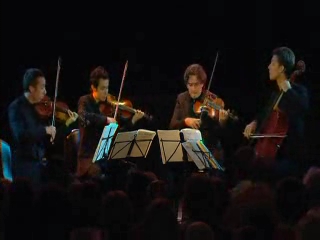Related Research Articles
Robert Wilfred Levick Simpson was an English composer, as well as a long-serving BBC producer and broadcaster.
The Aeolian Quartet was a highly reputed string quartet based in London, England, with a long international touring history and presence, an important recording and broadcasting profile. It was the successor of the pre-World War II Stratton Quartet. The quartet adopted its new name in 1944 and disbanded in 1981.
The Takács Quartet is a string quartet founded in Budapest, Hungary, and now based in Boulder, Colorado, United States.

The Emerson String Quartet, also known as the Emerson Quartet, was an American string quartet initially formed as a student group at the Juilliard School in 1976. It was named for American poet and philosopher Ralph Waldo Emerson and began touring professionally in 1976. The ensemble taught in residence at The Hartt School in the 1980s and is currently the quartet in residence at Stony Brook University. Both of the founding violinists studied with Oscar Shumsky at Juilliard, and the two alternated as first and second violinists for the group. The Emerson Quartet was one of the first such ensembles with the two violinists alternating chairs.

Sir Neville Marriner, was an English conductor and violinist. Described as "one of the world's greatest conductors", Gramophone lists Marriner as one of the 50 greatest conductors and another compilation ranks Marriner #14 of the 18 "Greatest and Most Famous Conductors of All Time". He founded the Academy of St Martin in the Fields, and his partnership with them is the most recorded of any orchestra and conductor.

The Lindsay String Quartet was a British string quartet from 1965 to 2005.
The Alban Berg Quartett was a string quartet founded in Vienna, Austria in 1970, named after Alban Berg.

The Melos Quartet was a much-recorded, Stuttgart-based string quartet active from 1965 until 2005, when its first violinist died. It also went by the name Melos Quartett Stuttgart, partly to distinguish itself from the equally prominent chamber group the Melos Ensemble of London.
Harold Truscott was a British composer, pianist, broadcaster and writer on music. Largely neglected as a composer in his lifetime, he made an important contribution to the British piano repertoire and was influential in spreading knowledge of a wide range of mainly unfashionable music.
Hugh Wood was a British composer.
Robert Still was a wide-ranging English composer of tonal music, who made strong use of dissonance. He produced four symphonies and four string quartets. As a songwriter he set words by Byron, Keats and Shelley.

The Pavel Haas Quartet is a Czech string quartet which was founded in 2002. Their first album with the second quartets of Haas and Janáček won the 2007 Gramophone Award for Chamber music. The Gramophone reviewer David Fanning described their playing as "streamlined but full-blooded". Their recording of the Dvořák String Quartets Op. 106 & 96 won the Gramophone Awards' most coveted "Recording of the Year" prize in 2011.
The Pascal Quartet was a French string quartet musical ensemble which took shape during the early 1940s and emerged after World War II to become a leading representative of the French performance tradition. It was named after its founder, the viola player Léon Pascal, and was occasionally termed the Leon Pascal Quartet.
The String Quartet No. 8 by Robert Simpson was composed in 1979 in response to a commission by the Brunel Philharmonic Society with funds made available from the Greater London Arts Association. The work is dedicated to Professor Gillett, who was the director of Biological Sciences at Brunel University in 1980, and his wife. The Quartet was first performed on 21 June 1980 by the Delme String Quartet at Brunel University.
The Concord String Quartet was an American string quartet established in 1971. The members of the quartet were Mark Sokol and Andrew Jennings, violins; John Kochánowski, viola; Norman Fischer, cello. They gave their last regular concert on May 15, 1987. An anniversary concert was given in December 1996 at the Naumburg Foundation.
The Signum Quartet is a string quartet based in Bremen, Germany. Founded in 1994, it has been playing in the current formation since 2016.

The Ébène Quartet is a French string quartet based in Boulogne-Billancourt, France.
Ernest Element was a British violinist and string quartet leader.
Lena Wood,, was a British violist with the Birmingham Philharmonic String Orchestra and the Birmingham Ladies' String Quartet. She was a pupil of Lionel Tertis, performing and broadcasting with a number of ensembles from the 1920s to the 1950s.
Gilbert Shufflebotham (1907–1978) was a British violist and violinist. He started his playing career on the violin, performing for radio broadcasts in the 1920s.
References
- ↑ Brown, Maurice J.E. (1958). Schubert: A Critical Biography, p. 20. MacMillan.
- ↑ e. g. BBC. Radio Times 1923 - 2009: Reger. (extract from Issue 1650, 24 June 1955, Page 43). Retrieved 26 June 2015.
- ↑ MacDonald, Malcolm. "Robert Simpson Lecture , Wigmore Hall, 15 March 2000 (reprinted with permission on Music-Web International). Retrieved 26 June 2015.
- ↑ Moore, David W. (January 1999). "Review: Simpson: Quartets Nos. 1-3 (Element Quartet)". American Record Guide . Retrieved 26 June 2015 (subscription required).